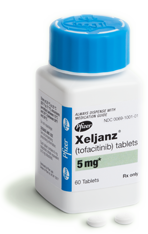 Clinical trials for alopecia areata are on our radar again this week.
Clinical trials for alopecia areata are on our radar again this week.
There are now three research centers in the US currently replicating studies with tofacitinib (Xeljanz) for severe AA. In 2014 we wrote about the mainstream media coverage of tofacitinib and ruxolitinib trials for AA, and about physician responses to the studies.
We also covered clinical trials in general and what a patient would want to consider before thinking of participating.
Now, to add to our understanding of alopecia clinical trials, we're excerpting from a respected source that reviews drugs to shed light on the original FDA-approved uses of tofacitinib and the known side effects.
The Bald Girls Do Lunch organization has been granted permission to quote directly from The Medical Letter® to bring you relevant sections from their subscription-only 2013 feature article “Tofacitinib (Xeljanz) for Rheumatoid Arthritis.” ***
Source: The Medical Letter®, Volume 55, (Issue 1407), January 7, 2013
We have selected passages from the article of greatest interest to patients with aloepecia areata.
“The FDA has approved tofacitinib (toe” fa sye’ ti nib; Xeljanz —Pfizer), an oral Janus kinase (JAK) inhibitor, for treatment of adults with moderately to severely active rheumatoid arthritis (RA) who have had an inadequate response to or are intolerant of methotrexate. Ruxolitinib (Jakafi) is the only other JAK inhibitor available in the US; it is FDA-approved for treatment of myelofibrosis, a serious bone marrow disorder."
"MECHANISM OF ACTION — JAK signaling is a critical step in hematopoiesis and immune activation. Tofacitinib prevents the phosphorylation and activation of intracellular mediators involved in immune response and inflammation that can lead to joint destruction.”
"ADVERSE EFFECTS —
- The adverse effects most commonly reported with tofacitinib have been diarrhea, nasopharyngitis, upper respiratory tract infection, headache and hyerptension. Severe, sometimes fatal, infections have occurred. Tuberculosis (TB) and other opportunistic infections have been reported. Patients should be tested for latent or active TB before starting tofacitinib.
- Gastrointestinal perforation has been reported during clinical trials with tofacitinib; patients with history of diverticulitis may be at higher risk. Low-density lipoprotein (LDL) and high-density lipoprotein (HDL) cholesterol have increased in patients taking tofacitinib; cholesterol levels should be checked 4-8 weeks after starting treatment. Elevations in liver aminotransferase levels have occurred; liver enzymes should be monitored regularly.
- Lymphocytopenia, neutropenia and low hemoglobin levels can develop in patients taking tofacitinib. Lymphocytes should be monitored at baseline and then every 3 months. Neutrophils and hemoglobin levels should be monitored at baseline, after 4-8 weeks of treatment, and then every 3 months."
"CLASSIFICATION — Tofacitinib is classified as category C (risk cannot be ruled out) for use during pregnancy. It is fetocidal and teratogenic in rats and rabbits."
"CONCLUSION — Tofacitinib (Xeljanz) is the first Janus kinase (JAK) inhibitor approved by the FDA for oral treatment of rheumatoid arthritis. Like other biologic agents used in rheumatoid arthritis, it can be effective, but can also cause some serious adverse effects. Until more data become available, tofacitinib probably should be reserved for use in patients who have not responded to other biologic agents."
***Our special thanks to The Medical Letter® On Drugs and Therapeutics for granting us permission to reproduce part of their article. The Medial Letter® is published by The Medical Letter, Inc. an independent nonprofit organization that provides health care professionals with unbiased drug prescribing recommendations. The editorial process used for its publications relies on a review of published and unpublished literature, with an emphasis on controlled clinical trials, and on the opinions of its consultants.

